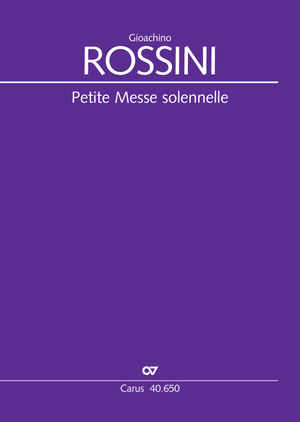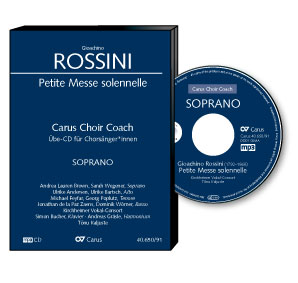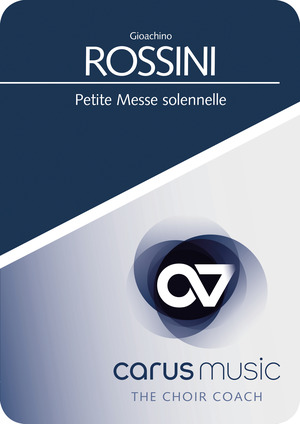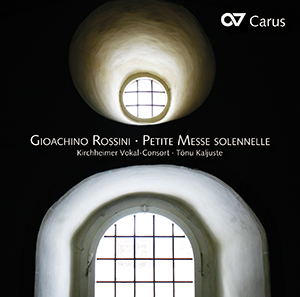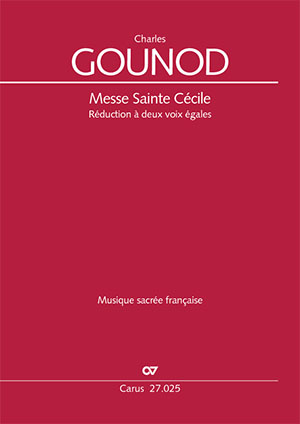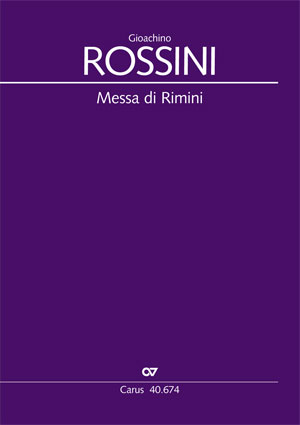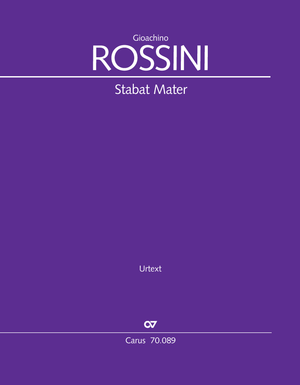Gioachino Rossini Petite Messe solennelle
1863
- Scoring:
- Soli SATB, Coro SATB, 2 Pfte, Armo
- Search for works with similar scoring
- Language:
- Latin
- Duration:
- 79 min
- Difficulty level:
- 1 2 3 4 5
Next to the Stabat Mater, the Petite Messe solennelle of 1863 is Rossini’s second extensive sacred composition. Ostensibly, the work was an occasional piece, written for the dedication of a private chapel for the once well-to-do Parisian nobility. This explains the reduced instrumental accompaniment for two pianos and harmonium. Of course this instrumental garb, reminiscent of decent, elevated salon music, produces an unmistakable timbre which through its typical Rossini rhythm obtains an additional flair.
 View
View
 Listen
(16)
Listen
(16)
 Practise
Practise
-
-
Practice aids voice part soprano
- Kyrie (Choir Coach)
- Gloria in excelsis Deo (Choir Coach)
- Et in terra pax (Choir Coach)
- Cum Sancto Spiritu (Choir Coach)
- Credo in unum Deum (Choir Coach)
- Et resurrexit (Choir Coach)
- Et vitam venturi (Choir Coach)
- Sanctus (Choir Coach)
- Agnus Dei (Choir Coach)
- Kyrie (Choir Coach, Slow mode)
- Gloria in excelsis Deo (Choir Coach, Slow mode)
- Et in terra pax (Choir Coach, Slow mode)
- Cum Sancto Spiritu (Choir Coach, Slow mode)
- Credo in unum Deum (Choir Coach, Slow mode)
- Et resurrexit (Choir Coach, Slow mode)
- Et vitam venturi (Choir Coach, Slow mode)
- Sanctus (Choir Coach, Slow mode)
- Agnus Dei (Choir Coach, Slow mode)
-
Practice aids voice part alto
- Kyrie (Choir Coach)
- Gloria in excelsis Deo (Choir Coach)
- Et in terra pax (Choir Coach)
- Cum Sancto Spiritu (Choir Coach)
- Credo in unum Deum (Choir Coach)
- Et resurrexit (Choir Coach)
- Et vitam venturi (Choir Coach)
- Sanctus (Choir Coach)
- Agnus Dei (Choir Coach)
- Kyrie (Choir Coach, Slow mode)
- Gloria in excelsis Deo (Choir Coach, Slow mode)
- Et in terra pax (Choir Coach, Slow mode)
- Cum Sancto Spiritu (Choir Coach, Slow mode)
- Credo in unum Deum (Choir Coach, Slow mode)
- Et resurrexit (Choir Coach, Slow mode)
- Et vitam venturi (Choir Coach, Slow mode)
- Sanctus (Choir Coach, Slow mode)
- Agnus Dei (Choir Coach, Slow mode)
-
Practice aids voice part tenore
- Kyrie (Choir Coach)
- Gloria in excelsis Deo (Choir Coach)
- Et in terra pax (Choir Coach)
- Cum Sancto Spiritu (Choir Coach)
- Credo in unum Deum (Choir Coach)
- Et resurrexit (Choir Coach)
- Et vitam venturi (Choir Coach)
- Sanctus (Choir Coach)
- Agnus Dei (Choir Coach)
- Kyrie (Choir Coach, Slow mode)
- Gloria in excelsis Deo (Choir Coach, Slow mode)
- Et in terra pax (Choir Coach, Slow mode)
- Cum Sancto Spiritu (Choir Coach, Slow mode)
- Credo in unum Deum (Choir Coach, Slow mode)
- Et resurrexit (Choir Coach, Slow mode)
- Et vitam venturi (Choir Coach, Slow mode)
- Sanctus (Choir Coach, Slow mode)
- Agnus Dei (Choir Coach, Slow mode)
-
Practice aids voice part basso
- Kyrie (Choir Coach)
- Gloria in excelsis Deo (Choir Coach)
- Et in terra pax (Choir Coach)
- Cum Sancto Spiritu (Choir Coach)
- Credo in unum Deum (Choir Coach)
- Et resurrexit (Choir Coach)
- Et vitam venturi (Choir Coach)
- Sanctus (Choir Coach)
- Agnus Dei (Choir Coach)
- Agnus Dei (Choir Coach, Slow mode)
- Kyrie (Choir Coach, Slow mode)
- Gloria in excelsis Deo (Choir Coach, Slow mode)
- Et in terra pax (Choir Coach, Slow mode)
- Cum Sancto Spiritu (Choir Coach, Slow mode)
- Credo in unum Deum (Choir Coach, Slow mode)
- Et resurrexit (Choir Coach, Slow mode)
- Et vitam venturi (Choir Coach, Slow mode)
- Sanctus (Choir Coach, Slow mode)
 Additional material
Additional material
- Purchase additional material as a download product.
-
 text (without music) for download, html file, Singing text, english translationhtml file, Singing text, english translation (Sample)
text (without music) for download, html file, Singing text, english translationhtml file, Singing text, english translation (Sample)1. Kyrie
Lord, have mercy on us.
Christ, have mercy on us.
Lord, have mercy on us.2. Gloria
Glory be to God on high.
And on earth peace to men
of good will.
We praise thee;
we bless thee;
we adore thee;
we glorify thee.
We give thee thanks
for thy great glory.
Lord God,
heavenly King,
God the almighty Father.
O Lord, the only begotten Son,
Jesus Christ,
O Lord God, Lamb of God,
... -
 text (without music) for download, html file, Singing text, German translationhtml file, Singing text, German translation (Sample)
text (without music) for download, html file, Singing text, German translationhtml file, Singing text, German translation (Sample)1. Kyrie
Herr, erbarme dich unser.
Christus, erbarme dich unser.
Herr, erbarme dich unser.2. Gloria
Ehre sei Gott in der Höhe.
Und Friede auf Erden den Menschen,
die guten Willens sind.
Wir loben dich,
wir preisen dich,
wir beten dich an,
wir rühmen dich.Wir danken dir, denn groß ist deine Herrlichkeit.
Herr und Gott, König des Himmels,
Gott, allmächtiger Vater.
Herr Jesus Christus, eingeborener Sohn,
Herr und Gott, Lamm Gottes, Sohn des Vaters.... -
 text (without music) for download, html file, Singing text, originalhtml file, Singing text, original (Sample)
text (without music) for download, html file, Singing text, originalhtml file, Singing text, original (Sample)1. Kyrie
Kyrie eleison.
Christe eleison.
Kyrie eleison.2. Gloria
Gloria in excelsis Deo.
Et in terra pax hominibus bonae voluntatis.
Laudamus te, benedicimus te, adoramus te, glorificamus te.
Gratias agimus tibi propter magnam gloriam tuam.
Domine Deus, Rex coelestis,
Deus Pater omnipotens.
Domine Fili unigenite, Jesu Christe.
Domine Deus, Agnus Dei, Filius Patris.
Qui tollis peccata mundi, miserere nobis.
Qui tollis peccata mundi, miserere nobis.
Qui tollis peccata mundi, suscipe deprecationem nostram.
Qui sedes ad dexteram Patris, miserere nobis.
Quoniam tu solus Sanctus,
tu solus Dominus, tu solus Altissimus, Jesu Christe.
Cum Sancto Spiritu, in gloria Dei Patris.
... -
 text (without music) for download, html file, Introductory text, Englishhtml file, Introductory text, English (Sample)
text (without music) for download, html file, Introductory text, Englishhtml file, Introductory text, English (Sample)Text from the CD Carus 83.406
Michael Wersin
Translation (abridged): Elizabeth RobinsonSacred music has evidently been entirely problematic ever since it first existed: the interconnection and intertwining of sublime texts representing the divine power of salvation, and charming melodies which directly transport the listener was already an ambivalent matter for St. Augustine throughout his life, although church music at that time was purely vocal and only in unison.
Almost a millennium and a half later, in 1863, an Italian opera composer called Gioachino Rossini was to write a setting of the Latin ordinary of the mass. He called this his Petite Messe solennelle and in a manuscript note at the beginning of the autograph score he described it as “Hélas le dernier peché mortel de ma vieillesse” (“Alas, the last mortal sin of my old age”). The ironically-intended self-criticism of the old mocker and blasphemer was by no means made in isolation, but basically reflected exactly that age-old aesthetic conflict surrounding the appropriate use of music in the liturgy, which erupted violently again in the 19th century.
Gioachino Rossini, who received a thoroughly conservative musical training at the Liceo in Bologna, and had
... -
 text (without music) for download, html file, Introductory text, Germanhtml file, Introductory text, German (Sample)
text (without music) for download, html file, Introductory text, Germanhtml file, Introductory text, German (Sample)Booklet-Text der CD Carus 83.406
Michael Wersin
Geistliche Musik, insbesondere als Vertonung unmittelbar zur Liturgie gehöriger Texte, ist ganz offensichtlich ein „Problemfall“, seit es sie gibt: Das Mit- und Ineinander von erhabenen, das göttliche Heilswirken repräsentierenden Texten und reizvollen, den Zuhörer unmittelbar mitreißenden Melodien blieb schon für den heiligen Augustinus zeitlebens eine ambivalente Angelegenheit, obwohl Kirchenmusik damals nur einstimmig und rein vokal zu sein pflegte: „Ich schwanke […] zwischen der Gefahr des bloßen Vergnügens und der Feststellung einer heilsamen Wirkung […]. Wenn es mir jedoch zustößt, dass mich mehr der Gesang als die gesungene Sache bewegt, dann bekenne ich mich einer Sünde schuldig und würde den Sänger lieber nicht hören“, klagte er um 400 in seinen Confessiones.
Fast eineinhalb Jahrtausende später, im Jahre 1863, sollte ein italienischer Opernkomponist namens Gioachino Rossini seine von ihm selbst Petite Messe solennelle genannte Vertonung des lateinischen Messordinariums in einem handschriftlichen Vermerk am Beginn des Autographs als „leider letzte Tod-Sünde meines Alters“ („Hélas le dernier peché mortel de ma vieillesse“) bezeichnen. Die
...
Contents
-
Composer
Gioachino Rossini
| 1792-1868
-
Editor
Klaus Döge
| 1951-2011
Reviews
Rossini
Rossini. Gioacchino: Petite Messe solennelle
Ein Besetzungs-Glücksfall der Chorliteratur, diese „Kleine feierliche Messe”, die nur einen Fehler hat: das so wenig werbewirksame Wort „klein” im Titel, weshalb es manchmal verschämt unterschlagen wird; und wer es tut, fühlt sich eigentlich im Recht, denn die Messe dauert etwa eineinhalb Stunden, und „klein” nennt sie nur die ironische Bescheidenheit des einundsiebzigjährigen Komponisten. Der Glücksfall also: ein abendfüllendes Werk dankbar für Solisten und Chor – und das „Orchester” besteht in der Originalfassung aus zwei Klavieren und Harmonium! Es gibt andere oratorische Werke in Fassungen für Orchester und nur mit Klavier oder Orgel (Brahms-Requiem, französische Werke), bei denen die Klavierfassung die „Sparfassung”, also eher der Notbehelf ist. Hier aber bei Rossini ist sie nicht nur chronologisch die frühere, sondern auch eindeutig die bessere: der Leichtfüßigkeit, Durchsichtigkeit, Eleganz wird der Klavierklang viel besser gerecht als die spätere aufgeplusterte Orchesterfassung mit tatsächlich schwerem Blech (4 Trompeten!) und 2 Harfen. Das zweite Klavier hat nur an zwei kurzen Stellen selbständige Führungen, sonst ist es als Tutti-Verstärkung eingesetzt. Das Harmonium gibt eine unverzichtbare aparte Farbe. Damit es neben einem Flügel bestehen kann, bräuchte man allerdings ein Druckluft-Harmonium, wie es Rossini vorgesehen hat - in Deutschland schwer zu bekommen. Die Ansprüche an die Solisten und vor allem an den Chor sollten nicht unterschätzt werden - verlangt wird Beweglichkeit und Virtuosität, die wohl nur mit einem nicht zu großen Ensemble erreicht werden kann.
Der Carus-Verlag trägt zur weiteren Verbreitung dieses beliebten Werkes mit einer vorbildlichen Ausgabe bei. Erschienen ist neben der Partitur ein Klavierauszug, eine Chorpartitur und eine eigene Stimme für Klavier II/Harmonium. Hingewiesen sei außerdem noch auf einzeln erschienene Teile: das Kyrie (nur Chor) in einer Einrichtung mit Orgel, „Christe eleison” (ein vierstimmiger Kanon) und „Sanctus” für Chor a cappella, sowie die Offertoriums-Fuge (Prelude religieux – „ein meisterwürdiges Stück, zu dem der alte Sebastian beifällig lächeln würde”, meinte schon 1872 ein Kritiker) für Klavier allein bzw. auch für Orgel.
Helmut Wolf
Quelle: Württembergische Blätter für Kirchenmusik 1/93, S. 34
Reviews on our website can only be submitted by customers with a registered user account. A check whether the rated products were actually purchased does not take place.
Frequent questions about this work
 There are no questions and answers available so far or you were unable to find an answer to your specific question about this work? Then click here and send your specific questions to our Customer Services!
There are no questions and answers available so far or you were unable to find an answer to your specific question about this work? Then click here and send your specific questions to our Customer Services!


